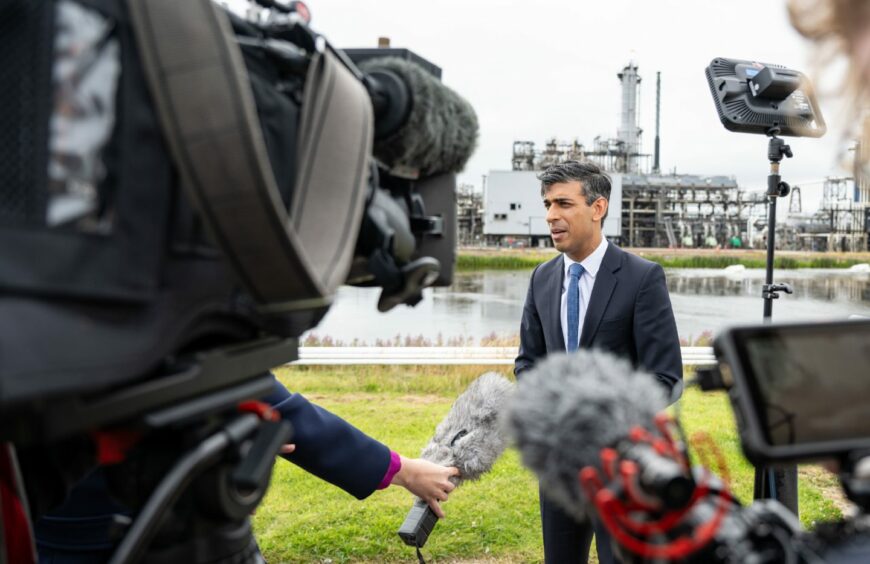
With questions hanging over the future of North Sea licences, legal experts have floated potential solutions which could reassure firms over the safety of new investments.
To the casual observer, it may seem as though it’s all steam ahead for North Sea drilling.
Prime Minister Rishi Sunak has affirmed support for “hundreds” of new North Sea exploration licences, while energy security secretary Grant Shapps argued the case for granting “every coneivable licence” in the basin.
Meanwhile, some areas continue to offer up record finds.
Yet the prospect of a new government with a new policy agenda – and the ongoing effects of the Energy Profits Levy (EPL) – has left some firms hesitant to invest.
Chief amongst their worries are plans mooted by Labour to ban new North Sea licences, despite reassurances from Keir Starmer that drilling permits for existing fields would continue to be issued and that any approvals granted between now and the next election would be honoured.
That’s not to mention the prevailing environment, with stark warnings from UN Secretary-General Antonio Guterres that investment in new fossil fuel production is “moral and economic madness”.
In a recent blog post senior associate Tom Edwards and partner Ben Sulaiman of law firm Hogan Lovells note that these developments, along with a 2011 increase in the supplementary tax charge on ring fence oil and gas profits, have all “damaged the North Sea’s reputation” for fiscal stability with investors.
“Investors may question whether there is sufficient certainty in the future UKCS fiscal and regulatory environment to sanction investment today in new petroleum licences and other upstream development,” they note.
Fiscal and regulatory stability
What then can government do to combat this?
A consultation on the UK’s fiscal regime is currently open to submissions, with Sulaiman and Edwards pointing to two potential avenues of enquiry.
The first is fiscal stability, where they suggest a mechanism often used in oil-producing countries that would preserve the net effect of fiscal terms applying to investments over the lifetime of projects.
In the UK they point to the contractual precedent set by Decommissioning Relief Deeds, which provide certainty to oil and gas companies as to the level of tax relief they will receive when decommissioning assets in the future.
“A similar arrangement could be offered to guarantee the application of current fiscal terms to all investment and profits realized from activities under future UKCS petroleum licences over the lifetime of the licences, effectively insuring investors against the risk of future tax hikes” they argue.
On the regulatory front, they suggest the UK government could offer a “guarantee” to compensate licensees for qualifying exploration expenditure and finance if a future government legislates to ban oil and gas development, or refuses to approve development projects for fields discovered by their exploration activities.
As well as offering protection to investors, they argue this may even disincentivise future governments from prohibiting new developments, given the potential liability.
“These proposals may well be politically unpalatable,” Edwards and Sulaiman note.
“But they are likely to be the kind of solutions that current and potential investors in the UKCS will be looking for to facilitate their future investment in upstream oil and gas in the UK as part of the energy transition.”
Licence round bellwether
Bob Ruddiman, partner and head of energy at Burness Paull concurred that a stable regime was essential to ensure investors make commitments and ensure their returns justify the risk involved – particularly when commodity prices can fluctuate.
“In an international market, developers and funders have other jurisdictions that they can choose to invest in,” he noted.
“Therefore, it’s important that the government – regardless of which political party is in power – recognises what is required to ensure reliable energy supply, a vibrant home market and all the benefits that brings in the form of creating and sustaining skills and jobs, driving innovation and new technology, and supporting an ecosystem that can not only be exported and globalised but also provides a platform for the energy transition.”
Judith Aldersey-Williams, counsel in the energy team at law firm CMS, also acknowledged the issues facing political leaders.
“The government attempted to allay criticism of continued North Sea licensing through use of its Climate Compatibility Checkpoint but this does not appear to have had the intended effect, with some green campaigners being openly scathing of the concept of climate compatible licensing, while Labour has said it will end further licensing entirely.”
Yet she was sceptical that fiscal and regulatory terms would change without further evidence.
“Oil and gas companies may rightly therefore be concerned about both the future regulatory and fiscal positions. However, oil companies are familiar with assessing political risk.
“While fiscal and regulatory stability is a highly desirable goal, it seems unlikely that the government will commit to legal guarantees not to change the goalposts on licensing or on tax unless there is clear evidence of a reluctance to apply for licences or proceed with developments.”
“The 33rd round closed for applications in January this year, well after the EPL was introduced in May 2022, though admittedly many bids may have been made before Kier Starmer’s announcement in Davos in January that Labour will end new licensing.
“The NSTA received 115 bids for 258 blocks or part blocks from 76 companies in which according to the NSTA was a similar number to the 32nd round.
“It’s therefore not clear that we have yet reached that point.”
Recommended for you

 © Euan Duff/PA Wire
© Euan Duff/PA Wire